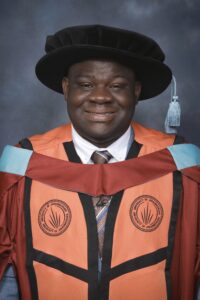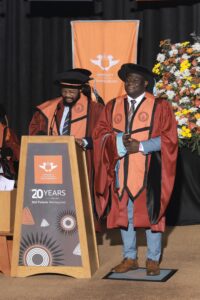Dr. Dare Leke Idowu holds a PhD in Political Studies from the University of Johannesburg, South Africa. He completed his Bachelor’s and Master’s degrees in Political Science at Obafemi Awolowo University, Ile-Ife, Nigeria. He was a 2023 awardee of the Social Science Research Council’s (SSRC) Next Generation in Social Sciences in Africa Doctoral Dissertation Research Fellowship Award, and a 2024 recipient of the British Academy Fellowship on Writing and Researching the Political Economy of Inequality in Africa. He is the Publications Officer of the Conflict Research Network (CORN) West Africa. He was an Assistant Lecturer in the Department of Political Science and International Relations at Bowen University, Iwo, Nigeria. He won the Bowen University Iwo Highest Published Awards (Humanities-Based Discipline, Third Position) in 2022. He has published articles in the Creative Industries Journal, the Round Table Journal, and the Journal of Contemporary African Studies. He has also contributed ten chapters to books published by Palgrave Macmillan, Routledge, Springer, and Bloomsbury Publishing.
Briefly describe the central argument of your doctoral dissertation. What is its main contribution to knowledge in your field?

My dissertation is titled “Regional Power Politics in the Fourth Industrial Revolution (4IR): Nigeria and South Africa in comparative perspective.” In this dissertation, I critiqued the dearth of scholarship on the political implications of the Fourth Industrial Revolution (4IR) for regional power politics in Africa, and demonstrate how the quest of Nigeria and South Africa for the continental leadership of the 4IR will disrupt and reshape regional power politics in Africa. To achieve these objectives, I critiqued the Classical Realist notions of power (hard), arguing that it is too narrow and deficient in unpacking the power politics context of the Nigeria and South Africa competition for the continental leadership of the 4IR. Building on this critique, I reconceptualize the power capabilities of regional powers in the 4IR to include non-orthodox forms of power, such as digital infrastructures, energy (electricity), and technologically skilled human capital. These non-coercive yet indispensable capabilities are crucial for asserting regional power acclaim in Africa’s 4IR.
The study is based on a comparative case study method, extant qualitative data, and the theoretical anchorage of Neoclassical Realism. I established the power politics context of the quest of Nigeria and South Africa for the hegemonic leadership of the 4IR in Africa, using the concepts of technological dependence, ‘borrowed brains’, and a self-inflicted energy crisis. I argue that neither Nigeria nor South Africa has relatively superior capabilities for asserting reckless leadership acclaim—that is, the tendency to pursue recognition as continental leaders in the 4IR without the institutional capacity or strategic foresight to sustain it. However, given its more sophisticated digital infrastructural and energy (electricity) capabilities, South Africa has an indisputable continental leadership edge over Nigeria. This implies that Nigeria is only a secondary power to South Africa in the 4IR.

However, both Nigeria and South Africa fall short of the benchmark for asserting a claim to the hegemonic leadership of the 4IR in Africa because of several domestic constraints that impede the translation of their abundant potential power resources into actual power capabilities for contesting the hegemonic leadership of the 4IR in Africa. The implication is that South Africa’s leadership edge could unsettle Nigeria’s decision-makers and trigger power politics. This will foster the expansion of their 4IR capabilities and a strong commitment to eradicating deficits in digital infrastructures, digital and data literacy, electricity capacity and availability, broadband and mobile internet, and human capital skills.
The major contribution of my dissertation to the field of International Relations is the reconceptualisation of the Classical Realist notion of power as hard (military and economic) capabilities that underpins the scholarship on regional power politics and hegemony in Africa. This is important because the orthodox notion of power, as hard power alone, is deficient in unraveling the power politics context of the quest for hegemonic leadership of the 4IR in Africa. Importantly, the reconceptualisation could serve as a new frame for rethinking and researching regional hegemony in the 4IR in Africa and the developing South.
How did the Next Gen fellowship program impact your doctoral journey?
The 2023 Next Gen Doctoral Dissertation Fellowship program made my aspiration for an international Doctoral education in a 4IR research-inclined University a reality. The Next Gen fellowship program impacted my doctoral journey in several ways. Firstly, it provided me with the financial resources to resume full-time Doctoral research in South Africa. My choice of pursuing a PhD in Political Studies at the Department of Politics and International Relations, University of Johannesburg, was informed by the availability of International Relations experts researching the power politics context of 4IR technologies in Africa. However, I lacked the funds to study in South Africa as an international student without a scholarship.
The 2023 Next Gen awards provided me with much-needed financial resources, enabling me to relocate and study full-time for my PhD in South Africa. The fellowship award also provided me with financial resources to take time off from teaching and administrative responsibilities, which initially slowed down the pace of my Doctoral research, and to avoid the distractions caused by the paucity of funds. The fellowship award also provided me with the financial resources to collect field data in Nigeria and South Africa and purchase several books on the 4IR. I could not have completed my PhD in South Africa without the financial support of the Next Gen Fellowship award.
Secondly, the writing and methodology workshops were important eye-openers for me in several research and academic writing areas. The mentors particularly provided awardees with constructive feedback and a collegial environment that allowed for the presentation of our ideas to mentors and peers. Cohort group leaders provided important comments and suggestions that contributed significantly to the timely completion of my Doctoral research. Apart from focusing on providing quality feedback on our drafts, the mentors provided professional advice that was pivotal to my doctoral journey. The fellowship provided me with the opportunity to network with colleagues and mentors. The program also sponsored my participation as a paper presenter at the special APN and Next Gen fellows panel held during the 2025 Lagos Studies Association (LSA) Conference.
Now that you have completed your PhD, what are your plans for the future?
My immediate plan is to apply for a postdoctoral research position. I intend to publish several articles and book monographs from my Doctoral dissertation, conduct research, and publish articles in other areas of my research interests in high-impact Political Science and International Relations Journals. I also plan to transition into a faculty position at a university to enable me to contribute to research, teaching, and learning of Political Science and International Relations.
What advice do you have for upcoming doctoral students?
I advise upcoming doctoral students to be on top of the literature underpinning their Doctoral research and research interests. They should also make good use of the methodological workshops and networking opportunities the Next Gen and APN program provides to all fellows.
A list of Dr. Dare Leke Idowu’s Published Works
Journal Articles
Idowu, D. L., (2022). Digital Activism and Social Change in Africa: Motivations, outcomes and constraints, Journal of Contemporary African Studies, 40(4): 526–543. https://doi.org/10.1080/02589001.2023.2177627
Idowu, D. L., & Ogunnubi, O. (2022). Soft power in therapeutic comedy: Outlining Nigeria’s creative industry through digital comic skits. Creative Industries Journal, 16(3): 361-382. https://doi.org/10.1080/17510694.2022.2025703
Idowu, D. L. & Ogunnubi. O. (2021). Music and Dance Diplomacy in the Covid-19 Era: Jerusalema and the Promotion of South Africa’s Soft Power. The Round Table Journal, 110(04): 461-476. https://doi.org/10.1080/00358533.2021.1956816
Selected Book Chapters
Idowu, D. L. (2025a). Digital Activism as a Quest for Social Justice by Nigerian Youth. In U.A. Bitrus-Ojiambo. O. Obyerodhyambo & A. J. Alonge (Eds.), #EndSARS Social Movement: Reflections (pp. 69–80). Langaa RPCIG. https://doi.org/10.2307/jj.29048695.10
Idowu, D. L. (2025b). Women in the Fourth Industrial Revolution (4IR): Perspectives, opportunities, and implications for Nigeria and South Africa. In T. A. Ojo. & B. Ndzendze. (Eds.), African Women in the Fourth Industrial Revolution: Change, policies, and approaches. (pp. 113-129). Routledge: London.
Ogunnubi, O. & Idowu, D.L. (2024). Kidnapping for Ransom (K4R) and the Challenges of Nigeria’s International Image. In J. S. Omotola & S. Oyewole (Eds.), The Political Economy of Kidnapping and Insecurity in Nigeria (pp 245–263). Advances in African Economic, Social, and Political Development. Springer, Cham. https://doi.org/10.1007/978-3-031-47168-1_14
Idowu, D. L. & Afolabi, O. (2023). Armed banditry and humanitarian crisis in Northern Nigeria. In A. C. Okoli. & S. Ngom (Eds.), Banditry, and the Security Crisis in Nigeria (pp. 135-149). Routledge: London. https://doi.org/10.4324/9781003350149
Ogunnubi, O. & Idowu, D. L. (2023). Borderless Africa, Illegal Migration and Food Insecurity in West Africa. In: Okunade. S. K. & Ogunnubi, O. (Eds.), ECOWAS Protocol on Free Movement and the AfCFTA in West Africa (pp. 169–189). Palgrave Macmillan: Singapore. https://doi.org/10/1007/978-981-19-5005-6 8
Idowu, D. L. & Ogunnubi, O. (2023). Big Brother Naija: A Catalyst for Nigeria’s Orange Economy. In: C. Isike, Ogunnubi, O. & Ukwueze, O. (Eds.), Big Brother Naija, and Popular Culture in Nigeria (pp. 203-223). Palgrave Macmillan, Singapore. https://doi.org/10.1007/978-981-19-8110-4_12
Idowu, D. L. & Agbalajobi, D. T. (2022). ECOWAS Protocol on Free Movement, Border Porosity, and the Emerging Threats to Human Security in North Central Nigeria: An Appraisal of the Influx of Migrant Fulani Herders. In: Oloruntoba S. O. (Ed.), Political Economy of Colonialism and Nation-Building in Nigeria (pp. 277-296). Switzerland: Palgrave Macmillan Cham. https://doi.org/10.1007/978-3-030-73875-4_15
Selected Book Reviews
Idowu D. L. (2025). South Africa confronts the Fourth Industrial Revolution (4IR) era: Challenges, Pathways and Possibilities. The Round Table Journal. https://doi.org/10.1080/00358533.2024.2438534
Idowu D. L. (2022). Review of Politics and Power in Africa: Nigeria and South Africa in comparative perspective, by Olusola Ogunnubi and Samuel Oyewole. African Affairs 121(484): 505-507 https://doi.org/10.1093/afraf/adac021
Idowu D. L. (2022). Review of the Crisis of Belonging and the Ethnographies of Peacebuilding in Kaduna State, by Benjamin Maiangwa. Africa Today. 68(3): 144-145. https://muse.jhu.edu/article/849100
Selected Blogs and Op-Eds
Idowu, D. L. (2023, August 9). Digital activism has failed in its promise to deliver social change in Africa. Africa at LSE Blog. Retrieved from https://blogs.lse.ac.uk/africaatlse/2023/08/09/digital-activism-has-failed-in-its-promise-to-deliver-social-change-in-africa/
Idowu, D. L. (2023, June 8). The Murky Tint of Nigeria’s New President: Nigeria’s Global Image under the Tinubu-Shettima Administration. The Republic Journal. Retrieved June 8, 2023, from https://republic.com.ng/june-july-2023/tinubu-shettima-administration-nigeria/
Maiangwa, B. & Idowu, D. L. (2022). The Guinea coup highlights the weaknesses of West Africa’s regional body. The Conversation Africa. Retrieved September 11, 2021, from https://theconversation.com/guinea-coup-highlights-the-weaknesses-of-west-africas-regional-body-167650

